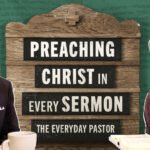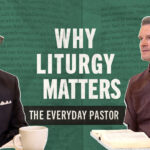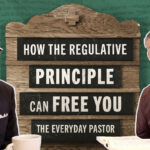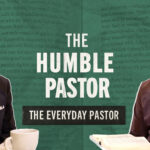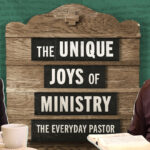A week has now passed since this was posted, and as the COVID-19 situation continues to worsen, we would like to highlight and clarify a few things. As the introduction states, this global pandemic is “deadly serious,” and therefore “all necessary precautions should be taken.” Nor do Lewis’s words map perfectly onto our present situation; they bear “some” relevance for today. Most readers, it seems, have gleaned a timely reminder without hearing marching orders in every detail. Nevertheless, we wish to be as explicit as possible: Lewis’s words are misapplied if taken to mean that COVID-19 is no big deal or shouldn’t disrupt life in any way. The reminder for us now—albeit in a different scenario seven decades later—is this: The threat of death is serious, but it’s never novel. So let’s not succumb to panic. Let’s not allow fear to dominate our minds and paralyze our hearts. Let’s keep living and laughing and serving and enjoying those we love (yes, even if from a necessary distance!). Because a good King is on the throne, we need not be slaves to fear.
You can keep track of TGC’s coronavirus coverage on this page.
It’s now clear that COVID-19 is a deadly serious global pandemic, and all necessary precautions should be taken. Still, C. S. Lewis’s words—written 72 years ago—ring with some relevance for us. Just replace “atomic bomb” with “coronavirus.”
In one way we think a great deal too much of the atomic bomb. “How are we to live in an atomic age?” I am tempted to reply: “Why, as you would have lived in the sixteenth century when the plague visited London almost every year, or as you would have lived in a Viking age when raiders from Scandinavia might land and cut your throat any night; or indeed, as you are already living in an age of cancer, an age of syphilis, an age of paralysis, an age of air raids, an age of railway accidents, an age of motor accidents.”
In other words, do not let us begin by exaggerating the novelty of our situation. Believe me, dear sir or madam, you and all whom you love were already sentenced to death before the atomic bomb was invented: and quite a high percentage of us were going to die in unpleasant ways. We had, indeed, one very great advantage over our ancestors—anesthetics; but we have that still. It is perfectly ridiculous to go about whimpering and drawing long faces because the scientists have added one more chance of painful and premature death to a world which already bristled with such chances and in which death itself was not a chance at all, but a certainty.
This is the first point to be made: and the first action to be taken is to pull ourselves together. If we are all going to be destroyed by an atomic bomb, let that bomb when it comes find us doing sensible and human things—praying, working, teaching, reading, listening to music, bathing the children, playing tennis, chatting to our friends over a pint and a game of darts—not huddled together like frightened sheep and thinking about bombs. They may break our bodies (a microbe can do that) but they need not dominate our minds.
— “On Living in an Atomic Age” (1948) in Present Concerns: Journalistic Essays
A new video created by Mighty:
Try Before You Buy: FREE Sample of TGC’s New Advent Devotional
 Choosing the right Advent daily devotional can be tough when there are so many options. We want to make it easier for you by giving you a FREE sample of TGC’s brand-new Advent devotional today.
Choosing the right Advent daily devotional can be tough when there are so many options. We want to make it easier for you by giving you a FREE sample of TGC’s brand-new Advent devotional today.
Unto Us is designed to help you ponder the many meanings of this season. Written by TGC staff, it offers daily Scripture readings, reflections, and questions to ponder. We’ll send you a free sample of the first five days so you can try it out before purchasing it for yourself or your church.








